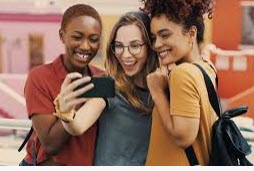
Social media usage has increased steadily in Canada, and it currently stands at 36.76 million using social media (Statista). With the increased popularity of social media, it is evident that people’s behavior has changed.
Selfies are an example of how people are consumed with posting and engaging with their followers. However, selfies are not always accurate since apps of filters can beautify the person, such as BeautyPlus or Instagram filters. These apps allow the person to enhance their looks to appear more appealing or achieve a specific image. Taking selfies can be broken down practically into science because the camera needs to be held a certain way; the person or persons should pose in a particular stance. Furthermore, lighting should not be too bright depending on the background. Here are some selfie tips: HOW TO TAKE A SELFIE: 13 TIPS THAT MAKE A DIFFERENCE
But Selfies are not only about posting beauty but capturing those real-time moments with friends or family. But, before mobile technology, the focus was about enjoying the moment, not taking a selfie. However, we must always look at both sides of the argument the following video shines a positive light on Selfie Culture:
Reference
Statista. (2021). Social media usage in Canada – statistics & facts. https://www.statista.com/topics/2729/social-networking-in-canada/
I was just listening to a podcast this week that was talking about studies that Facebook had done in 2019 (and never released) that looked at the effects of this online culture on the mental health of teenage girls. As you might guess, the effects are not good. Your post, Anna, reminds me of this. This selfie culture that now involves filters and body morphing apps. It’s hard to know what is real and what is not… creating the unrealistic beauty standard that young girls try to achieve, and when they don’t, their mental health suffers. If you want to read about the study, I have included a Guardian article here. The stats were just recently leaked.
https://www.theguardian.com/technology/2021/sep/14/facebook-aware-instagram-harmful-effect-teenage-girls-leak-reveals
Ha! Teaching Social Media Storytelling, this is a topic I tackle at the beginning of the course. As I am teaching storytelling, the way I always tackle this is to ask the students what the story is they are telling if their feeds are all full of selfies? And then suggest they try to limit their selfies to only 1 in 5 of their photos. The tough part with this for a lot of people is that the selfie unfortunately gets more likes, which unfortunately social media has seasoned us to crave.
There is also this great TEDxTalk that I love to share on turning the camera outwards: https://www.youtube.com/watch?v=aaoXCFBtoRo
Thanks for sharing Anna, Jasmine, and Erica. It does seem like humans are starting to miss the moment instead seeking out opportunities to celebrate themselves instead of the people and things around them. Outside of a focus on mindfulness, I think Erica’s storytelling theme is one of the only ways to bring people back into the moment. I tend not to bring a phone or camera to experiences that I truly want to experience. Partly due to my background, I know that having those tools with me inhibits my focus on living in the moment (instead I spend time crafting the right shot – mind you, those shots aren’t typically selfies).
The challenges of ensure that we use selfies for good rather than evil are loosely highlighted in the story that Jasmine shared (that was related to an Instagram for kids). Selfies will only become more pervasive if social media reliance is tampered with mindfulness and storytelling skills.